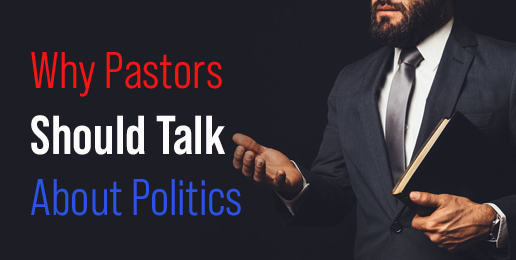
In today’s weird world, we treat religion and politics like two combustible chemicals. They must be kept in separate sealed containers and never allowed to mix with each other.
Government officials do their part by scrubbing all hints of Christ’s authority from any aspect of public life. But pastors also do their part, by scrubbing political statements from their sermons.
So this piece is written to pastors and church leaders. Here are four reasons why politics is a religious issue, and why you, as leaders in the faith, should address current political issues with your membership and help them think about these controversies in a biblical way.
First, as Pastor Douglas Wilson is fond of pointing out, all laws are imposed morality. Passing a law against anything is a statement that it is wrong. Homicide is wrong. Perjury is wrong. Speeding is wrong. But the only source of morality is religion. Popular consensus, expert opinion, and individual feelings might make things acceptable or not, but they don’t have power to make things wrong. Only God’s opinion has the power to make things wrong, so we are borrowing from Him whenever we pass a law. Therefore, laws are always rooted in a religious reality, so religion must have something to say about them.
Second, in today’s day and age, major “political” issues are really just religious issues. Yes, every political issue is religious at some level, but some are so much more obvious than others. For example, killing babies is wrong. You don’t need to make it a “political issue” to have a stance on that. Similarly, two men “marrying” is wrong, and boys “transitioning” into girls is wrong. Our religion addresses these topics directly, so if you’re a faithful Christian, you can’t avoid being “political.” It’s not so much because “religion got political,” but because politics has shifted so much that politics has gotten religious! If we faithfully confess what God says about these things, we will inevitably end up making political statements. So we’d better get used to it.
Third, if the church doesn’t speak, then Christians will get their political opinions elsewhere. Many parents know how important it is to address important topics with their kids in the context of the home—sexuality, drugs, social media, etc.—because if the kids don’t hear it from their parents, they will hear it in the school locker room. The same is true of the church. If the church doesn’t weigh in on political issues on Sunday, ordinary churchgoers will be immersed in popular culture and media Monday through Saturday, and they’ll hear smart, persuasive—yet ungodly—opinions about the same political issues. Deception is as real in politics as it is in theology. If Christ has something to say about a political issue, then His under-shepherds should have something to say as well.
Fourth, when the church doesn’t speak, the church shirks its responsibility to help God’s will be done on earth as it is in heaven. Shifting your responsibility to others helps no one and is simply cowardly. I once heard someone put it this way: Politicians say abortion is a religious issue, pastors say it’s a political issue, and the corpses pile up in between. And if I were a pastor, I’d hate to get to heaven and meet a baby there who died in an abortion clinic because I was too scared to speak and so I labeled it as a “political issue” so I could shirk my responsibility. As the quote attributed to Francis Schaeffer puts it:
“Every abortion clinic should have a sign in front of it saying, ‘Open by the permission of the church.'”
I don’t think I need to say much more. Politics is indeed a religious issue.
























